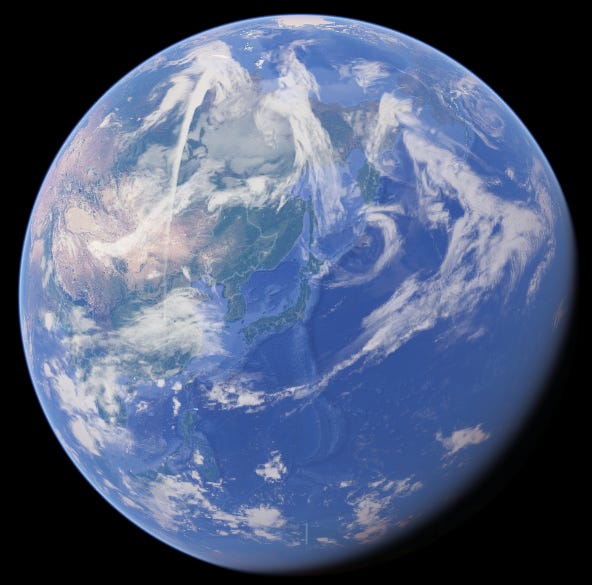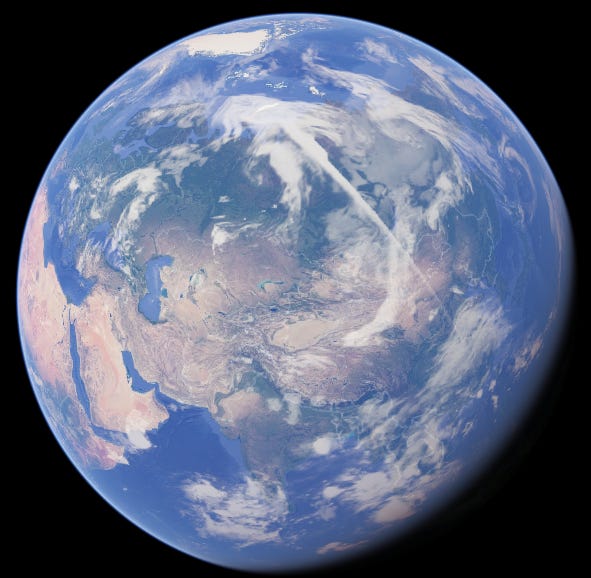“The West” Merely Relative? – Geographically Western Eurasia
The West's Emergence as a Historical Civilization (Excerpts from "We and the West" – 1/11)
What is "the West"? And how do we relate to it? Starting today, and as announced this August, I will be pre-publishing excerpts from my book Wir und der Westen (und die Welt) over the coming weeks, ahead of the full English edition's release under the title We and the West (and the World) later this year. The full list of excerpts is at the end of this post.
To find out what the West is, and whether there is in fact such a thing, one possible way is to search for traces of it in history. As mentioned above, we must search for the building blocks of what has connected people in communities. These include patterns of relationships (the social), systems of belief and thought (the cultural), the material and technological infrastructure (the economic), and language as a tool for communication and expression.
But first, why the "West"? As a geographical term, "West" is one of the four cardinal directions and is therefore relative, or, rather, context-dependent. West of what, and in relation to what?
In the customary depiction of the Earth with north at the top, 'west' denotes 'to the left of' whatever reference point is being used. At first glance, this appears relative. The same holds true for the term “Occident”, which describes the land of the setting sun, i.e., the West.
Illustration: Japan-centred view of the earth
Source: Screenshot from maps.google.com
Indeed, throughout human history, “the West” has denoted various things. One example is a classic work of 16th-century Chinese literature from the Ming dynasty, Journey to the West (西遊記 xīyóujì). In this tale, set nearly a millennium earlier in the 7th century during the Tang dynasty, a monk sets off on a journey to the West in search of Buddha's sacred scriptures. Here, “the West” meant India, that is, South Asia.
Is it merely relative though that the West amounts to being the West? If one looks at the Earth's landmasses, as opposed to the oceans, a human geography starting point allows for a different conclusion. The origin of the West lies in the west of Eurasia, the largest contiguous landmass of all. Eurasia – connected to Africa – has been the main pole of civilizational development and the political center throughout recent human history. Seen in this light, the West as objectively “Western Eurasia” may not appear entirely relative.
Illustration: The West in the World – Western Eurasia
Source: Screenshot from maps.google.com
In reality, the continuity of the notion of the West likely traces back to the ancient Greek world. The word Hesperia (Gr. Εσπερία, hespería), which can still denote Western Europe as a geographical term and in Greek mythology referred to certain places lying to the west of the known world, literally means “evening”. From the perspective of Greece, Western Europe is the Occident, the land in the west, where the sun sets.
Herodotus (490/480 BC - 430/420 BC), who was later described by Cicero in Rome as the father of historiography, had described the world known to the Greeks at that time. In his work, we find the contrast between the Eastern and Western worlds. The Eastern world was referred to as Asia and encompassed what is now West Asia, including the Persian Empire. The Western world encompassed present-day Europe and North Africa. We shall see in a bit how the continuity of the notion has developed over time. However, the idea of “the West” appears to have a background stretching back to antiquity.
Incidentally, the importance of Eurasia from a geopolitical perspective was already recognized by Halford Mackinder (1861-1947), a strategist of the British Empire. In an early moment of geopolitical analysis in 1904, he attributed central importance to the so-called "heartland," the inner regions of Eurasia. Whoever was able to control these parts of Eurasia would hold global supremacy. For him, this meant that the British Empire absolutely had to win the Great Game, the 19th-century conflict between Great Britain and Russia in Central Asia.
The same line of reasoning can also be found closer to the present moment in American strategic texts. Zbigniew Brzezinski, National Security Advisor to US President Carter from 1977 to 1981, wrote in 1997 in his book The Grand Chessboard: American Primacy and Its Geostrategic Imperatives about the importance of Eurasia for US global primacy. In his opinion, the imperative for the US was to prevent the emergence of a rival power pole on the Eurasian continent, making it essential to disrupt cooperation between powers such as Germany and Russia, or between China, Russia, and Iran. We will return to this point as well.
For what concerns Western influence in the world, it is worthwhile to trace the term Asia (Gr. Ἀσία, Asia) a little further. Remarkably, this term managed to reach the farthest corners of Eastern Eurasia.
To Herodotus and the ancient Greeks, Asia referred specifically to the region of Anatolia, i.e. present-day Turkey or, more generally, the regions east of themselves. Over time, the meaning expanded to encompass larger parts of the continent, until, by the time of the Roman Empire, it came to denote the entire "Asian" continent.
According to a hypothesis whose plausibility I cannot verify, the ancient Greeks derived the word Asia from the Akkadian word Asu, which is said to have meant "east" or "sunrise." What a remarkable illustration of the reach of Western influence: through the West's emergence as a civilizational force and its influence as a geopolitical entity, it came to pass that a place as remote as Japan, the "Land of the Rising Sun" (日本, Nihon or Nippon, literally "origin of the sun"), identifies itself as belonging to a continent named Ajia (アジア [pronounced like "ajia" with a soft, voiced "j"]), a phonetic transcription without intrinsic meaning, which is based on the earlier Greek designation of Asia.
The same is true for China, which calls the Asian continent Yàzhōu (亞洲, where the first character, read as Yà, is phonetic, and the second means "continent"), aligning the name with the "A" from the Western terms for Asia. This pattern holds for the majority of language regions I have checked.
PRE-PUBLISHING HERE OVER THE COMING WEEKS
Excerpts from We and the West (and the World):
I. The West's Emergence as a Historical Civilization
→ 1/11 The “West” Merely Relative? – Geographically Western Eurasia
→ 2/11 First Traces of the West 2500 Years Ago?
→ 3/11 Ancient Greece as a Key Reference – Not Only for the West
II. The West's Trajectory toward Modernity
→ 4/11 Switzerland’s Emergence at the Heart of the West
→ 5/11 Western Expansion and Imperial Continuity
→ 6/11 The West in Modernity – The Measure of Almost All Things
III. The West as a Contemporary Entity
→ 7/11 The West in the Global Order
→ 8/11 Unipolar, Hegemonic, Transatlantic Biases
→ 9/11 Various Moral Souls in the West’s Breast
→ 10/11 Western Modes of Functioning – “Liberal” and “Democratic”?
→ 11/11 Barely Veiled Oligarchies? Truly Legitimate Social Order?
→ Bonus: Whither, Post-Unipolar West?




